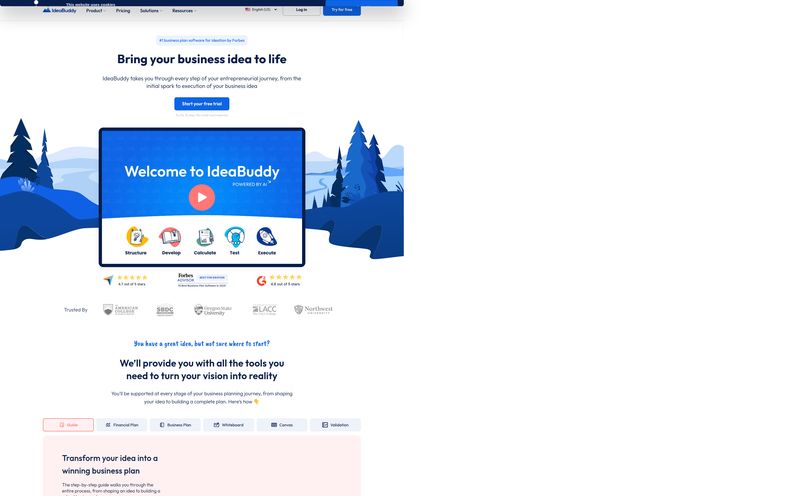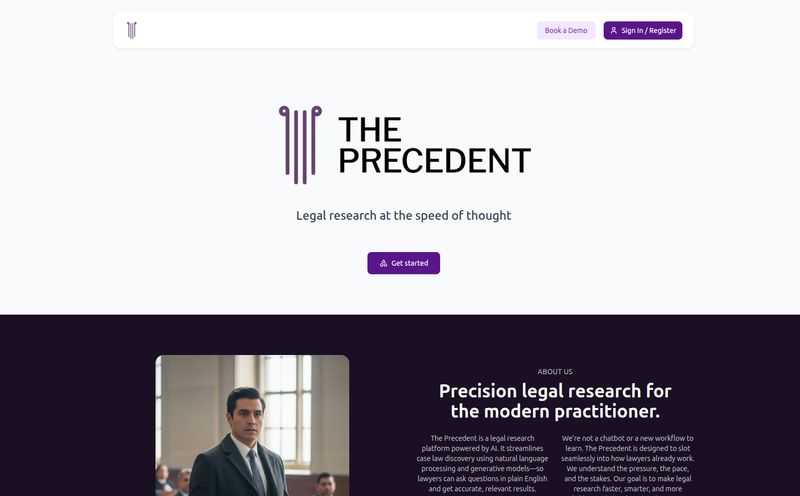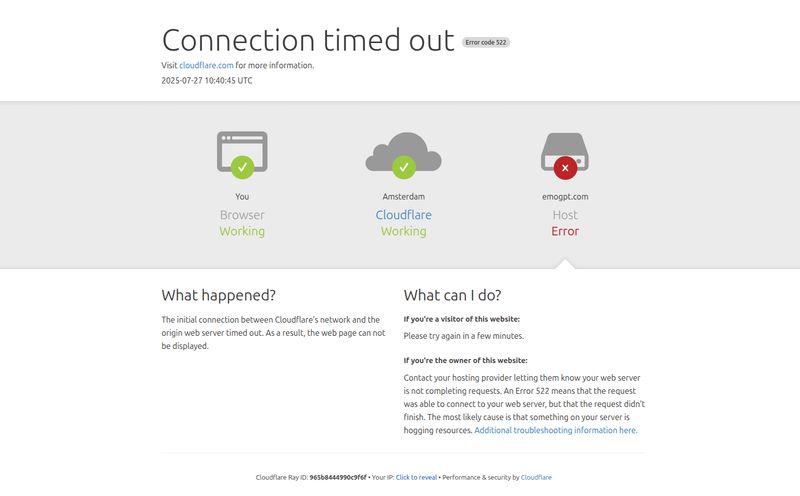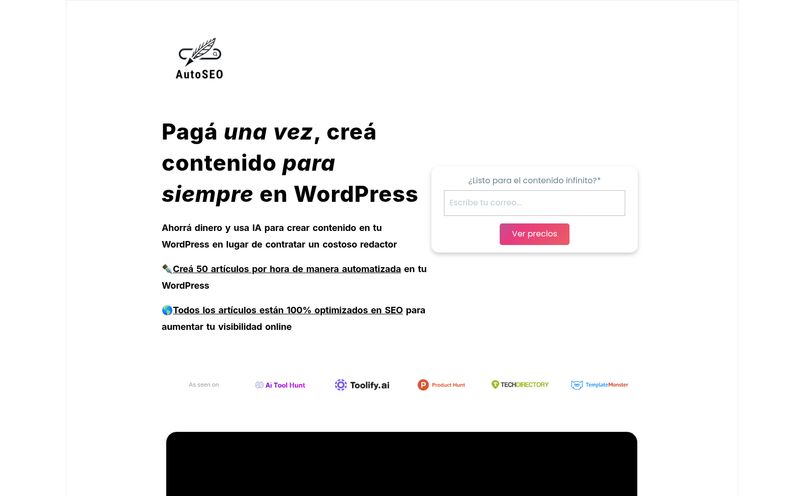We've all been there. It's 2 AM, the coffee has turned to sludge, and you're staring at a half-finished paper, wondering if your thesis statement even makes sense anymore. The blinking cursor mocks you. The mountain of research papers on your desk seems to be growing. Academic writing can be a special kind of torment, a mix of intellectual rigor and soul-crushing formatting rules.
Then along comes the AI revolution, promising to solve all our problems. We’ve seen a flood of AI writers that can spit out an essay in seconds. But for anyone in academia, that raises a huge, flashing red flag. Is it ethical? Is it even good? Does it help you learn, or does it just help you cheat? For the most part, I've been skeptical.
But then I stumbled upon a tool called Thesify. And I have to admit, my curiosity was piqued. It doesn't promise to write for you. Instead, it claims to be an AI-powered partner, an assistant built with educators to respect academic integrity. A bold claim. So, I decided to take a look and see if it's just marketing fluff or the real deal.
So, What Exactly is Thesify?
At its heart, Thesify is an AI-powered academic writing assistant. Think of it less like a ghostwriter and more like a super-smart, always-available tutor who's an expert in structure, argumentation, and citation. You upload your document—an essay, a grant proposal, a chapter of your thesis—and its AI gets to work, providing feedback. The company is pretty clear that its goal is to help you improve your own work, not replace your brain. That's a distinction that matters. A lot.
It’s designed for the folks in the trenches: high school and university students, grad students losing their minds over a dissertation, and researchers trying to get published. Basically, if you write academic stuff, they're talking to you.
My First Impressions: Looking at the Features
Okay, let's get into the nitty-gritty. What does this thing actually do? I took a tour of its main features, and a few things really stood out to me.
The Instant Feedback Engine
This is the core of Thesify. You give it your draft, and it gives you instant, constructive feedback. It looks at the big picture stuff: Is your argument logical? Is your structure sound? Is your writing clear and concise? I've always felt that getting good feedback is one of the biggest hurdles in writing. Your professor is busy, and your friends are too nice. Thesify acts like a neutral third party, a kind of structural engineer for your arguments.
It's not just flagging typos; it’s questioning your flow and pushing you to make your points stronger. For a student still figuring out how to build a persuasive essay, this could be incredibly helpful. It’s the kind of thing that builds skills over time, rather than just providing a quick fix.

Visit Thesify
Taming the Citation Beast
I will die on this hill: citation and reference management is the single most tedious part of academic writing. The hours I've lost trying to get my bibliographies perfect... it's painful to even think about. Thesify has an “Effortless Citation” tool that helps you find and format academic sources with ease. If it works as smoothly as advertised, this feature alone could be worth the price of admission. It’s a huge quality-of-life improvement that frees up brain space for what really matters—the ideas.
The “Too Long; Didn't Read” Slayer: Paper Digest
Now this is cool. The Paper Digest feature takes a dense research article and summarizes the key points for you. We all know that feeling of downloading ten papers for a literature review, only to realize half of them aren't quite relevant after you've spent an hour reading them. This tool lets you get the gist instantly. It’s not about skipping the reading, but about reading smarter. It helps you quickly triage sources so you can focus your deep-reading time on the papers that are truly important to your work. I love this idea.
Beyond Writing: Finding a Home for Your Research
For the PhDs and academics out there, Thesify has a Journal & Conference Finder. This shows a deep understanding of the academic world. Writing the paper is only half the battle; the other half is figuring out where to send it. This tool helps you identify suitable venues to publish your work or present your findings, which can be a confusing process for early-career researchers. It's a thoughtful addition that shows they get the full picture.
Okay, Let's Talk Money: Thesify Pricing
Alright, the all-important question. What’s the damage? The good news is, you can try it without opening your wallet.
Thesify has a Free plan that gives you 10 AI credits per month. This is more than enough to upload a short paper or a few esssays and see if you like the feedback style. It's a proper 'try before you buy' setup, which I always appreciate.
If you decide to go all-in, the pricing seems pretty reasonable, especially for a student budget. From what I've seen, they have a couple of options:
| Plan Type | Details |
|---|---|
| Free Plan | Includes 10 AI credits each month. Good for occasional use. |
| Annual Subscription | I saw a special sale price of €29.99 per year. This gives you all features and seems like an incredibly good deal if you're writing regularly. |
| Monthly Subscription | Another image showed a monthly plan of €2.49/month after a 7-day trial. Perfect if you just need help during finals season. |
Note: Prices can change, so it's always best to check their official pricing page for the latest info.
The Other Side of the Coin: Any Downsides?
No tool is perfect, right? Thesify lists a few of its own limitations, which I respect. It requires an internet connection (shocking, I know) and works best on a laptop or desktop. That's fair; nobody is seriously writing a 20-page paper on their phone.
One point that's interesting is that the editor only becomes available after you upload a document. This means you can't use it as a primary word processor. It's a dedicated feedback and refinement environment. In my experience, this might actually be a good thing. It forces you to get your initial thoughts down first and then switch into “editing mode.” A little separation between writing and editing is never a bad thing.
The bigger question, and it’s a philosophical one, is about relying on AI at all. Some might argue it makes students lazy. But I disagree, at least in this case. Thesify isn’t doing the thinking for you. It's a tool, like a calculator or a spell-checker. A calculator doesn't make you bad at math; it just lets you focus on the bigger problem. I think Thesify is aiming for the same thing: handle the tedious stuff so you can focus on your ideas.
My Final Verdict on Thesify
So, is Thesify the AI academic assistant we've been waiting for? I'm leaning towards a strong yes.
It's a smart, well-designed tool that seems to genuinely understand the struggles of academic writing. Its commitment to academic integrity is front and center, which sets it apart from a lot of the AI noise out there. It's not a cheating machine. It's a training partner.
If you're a student drowning in essays or a researcher trying to navigate the complex world of publishing, this is absolutely worth checking out. Start with the free plan. See how it feels. It might just be the thing that makes you dread that blinking cursor a little bit less.
Frequently Asked Questions about Thesify
- 1. Is using Thesify considered cheating?
- In my opinion, no. Thesify is designed to provide feedback and assist with things like citations and structure—it doesn't write content for you. It's a tool for improving your own work. However, always check your institution's specific policies on AI tools.
- 2. How much does Thesify cost?
- There's a free plan with 10 AI credits per month. Paid plans are available for full access, with a special annual price around €29.99/year and a monthly option around €2.49/month. Prices can vary, so check their site.
- 3. How is Thesify different from Grammarly?
- Grammarly is excellent for grammar, spelling, and tone. Thesify goes a step further by focusing on the core components of academic writing, like argument structure, logical flow, research paper summarization, and finding journals for publication. It's more specialized for academic work.
- 4. What are the AI credits on the free plan?
- AI credits are used to power the advanced features. For instance, generating feedback on a paper or summarizing an article would use credits. The 10 free credits a month let you test these core features on a smaller scale.
- 5. Can I use it on my phone or tablet?
- While it requires a web browser and should technically work, the platform is optimized for laptops and desktops with larger screens. This makes sense, as serious academic writing is typically done on a computer.
- 6. Who is Thesify best for?
- It's ideal for high school students, university undergraduates, graduate students working on a thesis or dissertation, and academic researchers preparing papers for publication.
Conclusion
The world of academic writing is tough enough without the added stress of clunky tools and writer's block. While the rise of AI has been met with justified caution, tools like Thesify show a more promising path forward. By focusing on assistance rather than replacement, and by building a platform that respects the rules of the academic game, they've created something that feels genuinely helpful. It could be the partner you need to turn that late-night struggle into a much smoother process.
References and Sources
- Thesify Official Website: https://www.thesify.ai
- Thesify Pricing Page: https://www.thesify.ai/pricing



